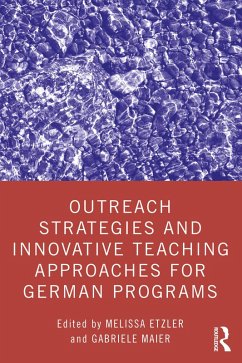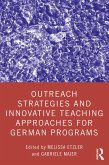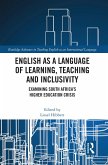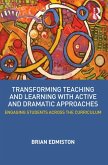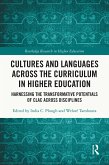Outreach Strategies and Innovative Teaching Approaches for German Programs (eBook, ePUB)
Redaktion: Etzler, Melissa; Maier, Gabriele
34,95 €
34,95 €
inkl. MwSt.
Sofort per Download lieferbar

17 °P sammeln
34,95 €
Als Download kaufen

34,95 €
inkl. MwSt.
Sofort per Download lieferbar

17 °P sammeln
Jetzt verschenken
Alle Infos zum eBook verschenken
34,95 €
inkl. MwSt.
Sofort per Download lieferbar
Alle Infos zum eBook verschenken

17 °P sammeln
Outreach Strategies and Innovative Teaching Approaches for German Programs (eBook, ePUB)
Redaktion: Etzler, Melissa; Maier, Gabriele
- Format: ePub
- Merkliste
- Auf die Merkliste
- Bewerten Bewerten
- Teilen
- Produkt teilen
- Produkterinnerung
- Produkterinnerung

Bitte loggen Sie sich zunächst in Ihr Kundenkonto ein oder registrieren Sie sich bei
bücher.de, um das eBook-Abo tolino select nutzen zu können.
Hier können Sie sich einloggen
Hier können Sie sich einloggen
Sie sind bereits eingeloggt. Klicken Sie auf 2. tolino select Abo, um fortzufahren.

Bitte loggen Sie sich zunächst in Ihr Kundenkonto ein oder registrieren Sie sich bei bücher.de, um das eBook-Abo tolino select nutzen zu können.
Outreach Strategies and Innovative Teaching Approaches for German Programs explores recruitment, curricular design and student retention in modern language instruction by sharing best practices and a wide variety of pragmatic initiatives from teacher-scholars who have been involved in the successful building of German programs.
- Geräte: eReader
- ohne Kopierschutz
- eBook Hilfe
- Größe: 5.55MB
Andere Kunden interessierten sich auch für
![Outreach Strategies and Innovative Teaching Approaches for German Programs (eBook, PDF) Outreach Strategies and Innovative Teaching Approaches for German Programs (eBook, PDF)]() Outreach Strategies and Innovative Teaching Approaches for German Programs (eBook, PDF)34,95 €
Outreach Strategies and Innovative Teaching Approaches for German Programs (eBook, PDF)34,95 €![Best Practices in English Teaching and Learning in Higher Education (eBook, ePUB) Best Practices in English Teaching and Learning in Higher Education (eBook, ePUB)]() Best Practices in English Teaching and Learning in Higher Education (eBook, ePUB)42,95 €
Best Practices in English Teaching and Learning in Higher Education (eBook, ePUB)42,95 €![English as a Language of Learning, Teaching and Inclusivity (eBook, ePUB) English as a Language of Learning, Teaching and Inclusivity (eBook, ePUB)]() English as a Language of Learning, Teaching and Inclusivity (eBook, ePUB)42,95 €
English as a Language of Learning, Teaching and Inclusivity (eBook, ePUB)42,95 €![Transforming Teaching and Learning with Active and Dramatic Approaches (eBook, ePUB) Transforming Teaching and Learning with Active and Dramatic Approaches (eBook, ePUB)]() Brian EdmistonTransforming Teaching and Learning with Active and Dramatic Approaches (eBook, ePUB)51,95 €
Brian EdmistonTransforming Teaching and Learning with Active and Dramatic Approaches (eBook, ePUB)51,95 €![Learning and Teaching Chinese as a First Language (eBook, ePUB) Learning and Teaching Chinese as a First Language (eBook, ePUB)]() Learning and Teaching Chinese as a First Language (eBook, ePUB)42,95 €
Learning and Teaching Chinese as a First Language (eBook, ePUB)42,95 €![Performed Culture in Action to Teach Chinese as a Foreign Language (eBook, ePUB) Performed Culture in Action to Teach Chinese as a Foreign Language (eBook, ePUB)]() Performed Culture in Action to Teach Chinese as a Foreign Language (eBook, ePUB)42,95 €
Performed Culture in Action to Teach Chinese as a Foreign Language (eBook, ePUB)42,95 €![Cultures and Languages Across the Curriculum in Higher Education (eBook, ePUB) Cultures and Languages Across the Curriculum in Higher Education (eBook, ePUB)]() Cultures and Languages Across the Curriculum in Higher Education (eBook, ePUB)42,95 €
Cultures and Languages Across the Curriculum in Higher Education (eBook, ePUB)42,95 €-
-
-
Outreach Strategies and Innovative Teaching Approaches for German Programs explores recruitment, curricular design and student retention in modern language instruction by sharing best practices and a wide variety of pragmatic initiatives from teacher-scholars who have been involved in the successful building of German programs.
Dieser Download kann aus rechtlichen Gründen nur mit Rechnungsadresse in A, B, BG, CY, CZ, D, DK, EW, E, FIN, F, GR, HR, H, IRL, I, LT, L, LR, M, NL, PL, P, R, S, SLO, SK ausgeliefert werden.
Produktdetails
- Produktdetails
- Verlag: Taylor & Francis eBooks
- Seitenzahl: 228
- Erscheinungstermin: 28. Dezember 2020
- Englisch
- ISBN-13: 9781000286205
- Artikelnr.: 60686972
- Verlag: Taylor & Francis eBooks
- Seitenzahl: 228
- Erscheinungstermin: 28. Dezember 2020
- Englisch
- ISBN-13: 9781000286205
- Artikelnr.: 60686972
- Herstellerkennzeichnung Die Herstellerinformationen sind derzeit nicht verfügbar.
Melissa Etzler is a Lecturer of German and First Year Seminar at Butler University in Indianapolis. She has published book chapters related to her research on author W. G. Sebald and has recently shifted her focus to ecocritical readings of Gothic German texts and films, her most recent article appearing in German Quarterly. In addition to her regular coursework, she teaches in honors and coleads the annual short-term study abroad program Bulldogs in Berlin. She is the recipient of the AATG Indiana Post-Secondary Teacher of the Year Award (2018), the College of Liberal Arts and Sciences Outstanding Faculty Award for Excellence in Teaching (2018) and an Outstanding Professor of the Year Award for Teaching (2018-19). Gabriele Maier is Associate Teaching Professor of German Studies and Director of the M.A. program in Global Communication and Applied Translation at Carnegie Mellon University (CMU) in Pittsburgh. Her research includes literature of the 20th and 21st century and focuses primarily on travel writing, questions of home and identity, transcultural writers and graphic novels. She has published on Christian Kracht, Hans-Ulrich Treichel and Christoph Ransmayr, among others; coedited an anthology on Heimat; and her textbook Deutschland im Zeitalter der Globalisierung came out in 2015. Lately, she has contributed an article to the MLA Handbook Strategies and Perspectives on Social Justice Work. She is a fellow of the "How Well?" project funded by the Center for the Arts in Society at CMU, where she works with various student groups to educate the public about food insecurity and how to improve well-being on the CMU campus.
Table of Contents
Contributors
Introduction: When Global Citizenry Does Not Include Language Learning: The
Challenges of Foreign Languages Departments in the 21st Century
Melissa Etzler and Gabriele Maier
1. Reinvigorating a Small Undergraduate German Program through an
Integrated, Literacies-Based Curriculum
Jennifer Redmann
2. Bringing Global and Local Together: Program Building through ACTFL's
"Community C"
Wendy Westphal
3. Learning German in and for the 21st Century
Birgit A. Jensen, Susanne Lenné Jones, David L. Smith and Jill E. Twark
4. Diversity Programming, Student Outreach and the Politics of Visible
Inclusivity for Small German Programs
Ervin Malakaj
5. Southern Illinois University Carbondale: One Public University's
Experience with International Studies in the Midwest
Mary A. Bricker
6. Designing a Language Lab that Encompasses Cultural and Interdisciplinary
Experiences
Martina Wells
7. The Courage to Construct and Experiment: Initiatives in Updating the
German Minor Program at Concordia University
Stefan Bronner and Regina Range
8. Strategies for Teaching 18th-Century German Texts in the Context of
Program Building
Jeffrey L. High, Elena Pnevmonidou and Friederike von Schwerin-High
9. Technology-Enhanced Learning Approaches to Curriculum Development:
Architecture Meets the Humanities
Gabriele Maier
10. Freundschaft, Motivationstraining und Märchen: Learning by Living Life
in the GDR
Andrea Meyertholen
11. Branching Out with STEM in the German Classroom
Melissa Etzler and Michelle Stigter-Hayden
12. The Deutsche Sommerschule am Pazifik: A Model and Asset to Small German
Programs
Carrie Collenberg-González
Conclusion: The Future is Now: Saving German Studies in a Brave New World
Mirko H. Hall
Index
Contributors
Introduction: When Global Citizenry Does Not Include Language Learning: The
Challenges of Foreign Languages Departments in the 21st Century
Melissa Etzler and Gabriele Maier
1. Reinvigorating a Small Undergraduate German Program through an
Integrated, Literacies-Based Curriculum
Jennifer Redmann
2. Bringing Global and Local Together: Program Building through ACTFL's
"Community C"
Wendy Westphal
3. Learning German in and for the 21st Century
Birgit A. Jensen, Susanne Lenné Jones, David L. Smith and Jill E. Twark
4. Diversity Programming, Student Outreach and the Politics of Visible
Inclusivity for Small German Programs
Ervin Malakaj
5. Southern Illinois University Carbondale: One Public University's
Experience with International Studies in the Midwest
Mary A. Bricker
6. Designing a Language Lab that Encompasses Cultural and Interdisciplinary
Experiences
Martina Wells
7. The Courage to Construct and Experiment: Initiatives in Updating the
German Minor Program at Concordia University
Stefan Bronner and Regina Range
8. Strategies for Teaching 18th-Century German Texts in the Context of
Program Building
Jeffrey L. High, Elena Pnevmonidou and Friederike von Schwerin-High
9. Technology-Enhanced Learning Approaches to Curriculum Development:
Architecture Meets the Humanities
Gabriele Maier
10. Freundschaft, Motivationstraining und Märchen: Learning by Living Life
in the GDR
Andrea Meyertholen
11. Branching Out with STEM in the German Classroom
Melissa Etzler and Michelle Stigter-Hayden
12. The Deutsche Sommerschule am Pazifik: A Model and Asset to Small German
Programs
Carrie Collenberg-González
Conclusion: The Future is Now: Saving German Studies in a Brave New World
Mirko H. Hall
Index
Table of Contents
Contributors
Introduction: When Global Citizenry Does Not Include Language Learning: The
Challenges of Foreign Languages Departments in the 21st Century
Melissa Etzler and Gabriele Maier
1. Reinvigorating a Small Undergraduate German Program through an
Integrated, Literacies-Based Curriculum
Jennifer Redmann
2. Bringing Global and Local Together: Program Building through ACTFL's
"Community C"
Wendy Westphal
3. Learning German in and for the 21st Century
Birgit A. Jensen, Susanne Lenné Jones, David L. Smith and Jill E. Twark
4. Diversity Programming, Student Outreach and the Politics of Visible
Inclusivity for Small German Programs
Ervin Malakaj
5. Southern Illinois University Carbondale: One Public University's
Experience with International Studies in the Midwest
Mary A. Bricker
6. Designing a Language Lab that Encompasses Cultural and Interdisciplinary
Experiences
Martina Wells
7. The Courage to Construct and Experiment: Initiatives in Updating the
German Minor Program at Concordia University
Stefan Bronner and Regina Range
8. Strategies for Teaching 18th-Century German Texts in the Context of
Program Building
Jeffrey L. High, Elena Pnevmonidou and Friederike von Schwerin-High
9. Technology-Enhanced Learning Approaches to Curriculum Development:
Architecture Meets the Humanities
Gabriele Maier
10. Freundschaft, Motivationstraining und Märchen: Learning by Living Life
in the GDR
Andrea Meyertholen
11. Branching Out with STEM in the German Classroom
Melissa Etzler and Michelle Stigter-Hayden
12. The Deutsche Sommerschule am Pazifik: A Model and Asset to Small German
Programs
Carrie Collenberg-González
Conclusion: The Future is Now: Saving German Studies in a Brave New World
Mirko H. Hall
Index
Contributors
Introduction: When Global Citizenry Does Not Include Language Learning: The
Challenges of Foreign Languages Departments in the 21st Century
Melissa Etzler and Gabriele Maier
1. Reinvigorating a Small Undergraduate German Program through an
Integrated, Literacies-Based Curriculum
Jennifer Redmann
2. Bringing Global and Local Together: Program Building through ACTFL's
"Community C"
Wendy Westphal
3. Learning German in and for the 21st Century
Birgit A. Jensen, Susanne Lenné Jones, David L. Smith and Jill E. Twark
4. Diversity Programming, Student Outreach and the Politics of Visible
Inclusivity for Small German Programs
Ervin Malakaj
5. Southern Illinois University Carbondale: One Public University's
Experience with International Studies in the Midwest
Mary A. Bricker
6. Designing a Language Lab that Encompasses Cultural and Interdisciplinary
Experiences
Martina Wells
7. The Courage to Construct and Experiment: Initiatives in Updating the
German Minor Program at Concordia University
Stefan Bronner and Regina Range
8. Strategies for Teaching 18th-Century German Texts in the Context of
Program Building
Jeffrey L. High, Elena Pnevmonidou and Friederike von Schwerin-High
9. Technology-Enhanced Learning Approaches to Curriculum Development:
Architecture Meets the Humanities
Gabriele Maier
10. Freundschaft, Motivationstraining und Märchen: Learning by Living Life
in the GDR
Andrea Meyertholen
11. Branching Out with STEM in the German Classroom
Melissa Etzler and Michelle Stigter-Hayden
12. The Deutsche Sommerschule am Pazifik: A Model and Asset to Small German
Programs
Carrie Collenberg-González
Conclusion: The Future is Now: Saving German Studies in a Brave New World
Mirko H. Hall
Index
